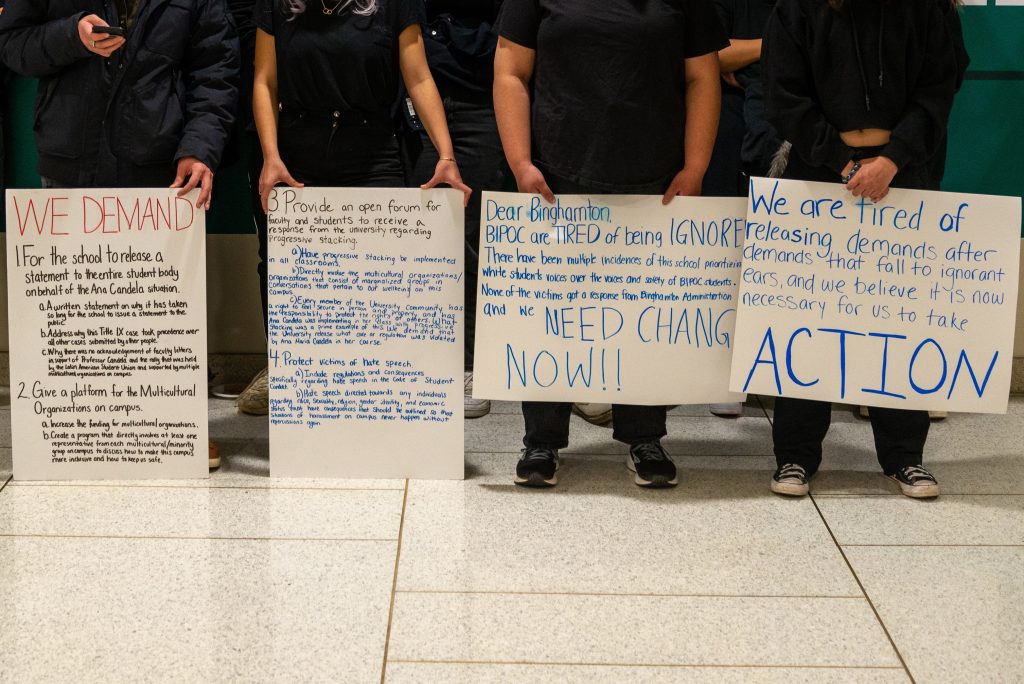The Binghamton University Multicultural Coalition held a sit-in protest in the Tillman Lobby of the University Union on Sunday regarding the treatment of Black, Indigenous and people of color (BIPOC) students on campus.
The BU Multicultural Coalition is a newly created campus group, consisting of students from various multicultural organizations. According to their Instagram page, the group’s goal is to promote the voices of BIPOC students on campus and to protest mistreatment of women and people of color at BU. The group cited a recent incident involving a February Title IX report against Ana Maria Candela, an assistant professor of sociology, who gave priority to calling on BIPOC, female and shy students in lectures as part of a “progressive stacking” policy found in her syllabus. The coalition also highlighted an earlier situation in the spring 2021 semester, where a student had made a racist remark about a Black teaching assistant, also in a sociology class.
An anonymous student organizer said that while the protest was in response to these incidents, it was not limited to them.
“So we’re mainly doing this just because of the incident from Professor Candela,” the anonymous student said. “It’s not just about her, but about school policies because through conversations with different faculty, we found that [BU] has only pushed forward negative treatment toward minorities, even within their faculty.”
In addition to holding the protest, the BU Multicultural Coalition prepared a list of demands for the University to uphold. The demands included calling upon the University to release a statement on the Candela incident — also to explain their delay in releasing a statement amid extensive media coverage from outside of campus — to give a better platform to multicultural organizations on campus through methods such as increased funding, to protect victims of hate speech and to provide an open forum for faculty and students to receive a response from the University regarding progressive stacking.
The coalition had also specifically called for the implementation of progressive stacking in all classrooms, the release of the exact “code or regulation” Candela had violated and the creation of a program involving students from each multicultural organization on campus to discuss making the campus more inclusive.
Another anonymous student organizer talked about the protest’s importance to the broader discussion of racism on campus, and the various steps that had been taken by groups on campus leading up to it.
“The reason and importance for this event are that [people of color (POC)] students, especially the multicultural organizations, have done everything to try and get the school to listen to their concerns,” the anonymous student wrote in an email. “However, it gets ignored or undermined because the school believes that there either isn’t a problem or that they’ve fixed it. Just for the Candela case alone, five departments emailed the administration in support of her, and four organizations, including [the] Student Association [(SA)], made a statement in support. None of this was acknowledged and we’ve overall just had enough.”
In a recent SA meeting, BU President Harvey Stenger said that while the University had not provided a response in a public announcement, it had provided a letter from Donald Nieman, provost and executive vice president for academic affairs, to about 15 people by request. The letter had stated that Candela’s progressive stacking policy violated Title VI of the Civil Rights Act of 1964, and Title IX of the Education Amendments of 1972, as well as the “principles of effective teaching” found in the Faculty-Staff Handbook.
On Friday and Saturday, protestors had gathered in University Union West to create posters. Many signs displayed by members of the coalition listed their reasons for the event and called upon BU to take action in response.
“Dear [BU], BIPOC are tired of being ignored,” a sign read. “There have been multiple incidents of this school prioritizing white student voices over the voices and safety of BIPOC students. None of the victims have gotten a response from the administration and we need change now. We are tired of releasing demands after demands that fall to ignorant ears, and we believe it is now necessary for us to take action.”
Fiona Gibson, a sophomore majoring in integrative neuroscience, said she believes it is important for administrators responsible for addressing such issues to see these student-formed demands.
“I think what they are doing is good, and for a good cause,” Gibson said. “[BU] does not treat their POC students correctly, and it needs to be addressed. I think their list of demands is very reasonable. The silent stand-in protest is smart, especially on admitted students’ weekend. It shows the incoming students that [BU] needs to be improved, and it sends a message to [BU President] Harvey Stenger.”
Winona MacPhee, a sophomore majoring in psychology, said the protest increased her understanding of the experiences of groups on campus.
“Personally, I was not aware of these things occurring at [BU], and seeing all of these students come together and protest in the [University Union] made me aware of these issues,” MacPhee said. “I will now be thinking about this and want to take action.”
Kaitlyn Hart was a contributing reporter for this article.



